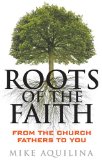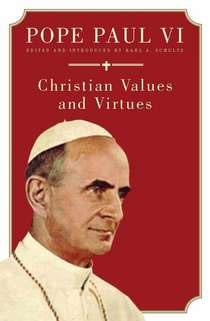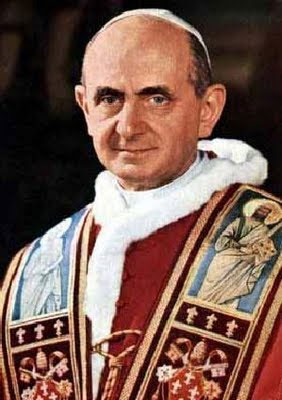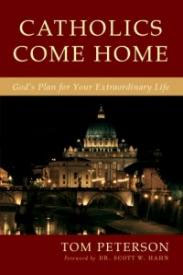[powerpress]
Episode 3 – Confession: the history of mercy
Roots of the Faith – From the Church Fathers to You with Mike Aquilina,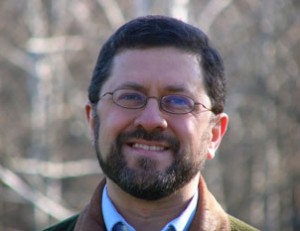 makes clear that just as an acorn grows into a tree and yet remains the same plant, so the Catholic Church is a living organism that has grown from the faith of the earliest Christians into the body of Christ we know today.
makes clear that just as an acorn grows into a tree and yet remains the same plant, so the Catholic Church is a living organism that has grown from the faith of the earliest Christians into the body of Christ we know today.
Also visit Mike’s “Discerning Hearts†page for more audio downloads and information!
Tags: audio, catholic church, downloads, mercy
This entry was posted on Thursday, March 5th, 2015 at 6:00 am
You can follow any responses to this entry through the RSS 2.0 feed.
With a pastor’s heart and eagle-eye accuracy, the gifted Al Kresta addresses “Dangers to the Faith: Recognizing Catholicism’s 21st Century 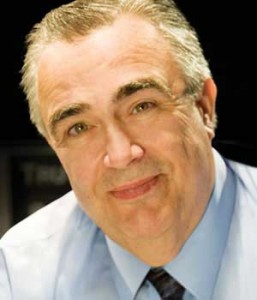 Opponents” in his newest book published by Our Sunday Visitor.    The secular world has presented many twisted versions of the “Truth” over the years: from New Age thought to Isalm, Scientism to Consumerism, Oprah and Shirley to Bart Erhman and Carl Sagan. Al Kresta challenges the “opponents” of faith with Christ-like love and wisdom. In the process, he teaches us all how to evangelize as a true disciple of Christ. A must have work for all those who may have a seeking heart and a desire to grow in their faith and to share it with family, friends and all they may encounter. One of the best books offered in this Year of Faith….a modern classic that should be in every Catholic home!
Opponents” in his newest book published by Our Sunday Visitor.    The secular world has presented many twisted versions of the “Truth” over the years: from New Age thought to Isalm, Scientism to Consumerism, Oprah and Shirley to Bart Erhman and Carl Sagan. Al Kresta challenges the “opponents” of faith with Christ-like love and wisdom. In the process, he teaches us all how to evangelize as a true disciple of Christ. A must have work for all those who may have a seeking heart and a desire to grow in their faith and to share it with family, friends and all they may encounter. One of the best books offered in this Year of Faith….a modern classic that should be in every Catholic home!
Here is part 1 of our discussion.
[powerpress]
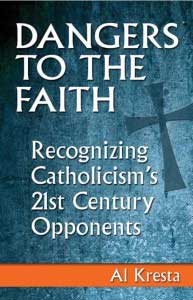 You can find the book here
You can find the book here
Be sure to listen to “Kresta in the Afternoon” on the Ave Maria Radio Network
From the description:
Dangers to the Faith: Recognizing Catholicism’s 21st Century Opponents is the perfect springboard for discussing the new world in which the Catholic Church exists today. Learn how to better carry out the missionary mandate of the Church. The question isn’t whether you will be a witness to Christ, but whether you will be a faithful witness.
Tags: al kresta, catholic church, Century Opponents, witness
This entry was posted on Tuesday, December 31st, 2013 at 5:34 am
You can follow any responses to this entry through the RSS 2.0 feed.
Canon of Scripture
[powerpress]
On this Faith Check, let’s talk a little about how we got God’s Holy Word.
The early Christians relied on the Greek translation of the Old Testament, which is the version most often quoted in the New Testament and the one Jesus probably heard growing up. This version also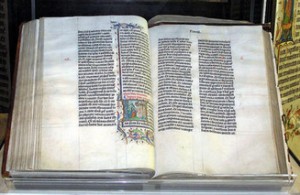 includes the books that Protestants call the “Apocrypha†and typically don’t include in their Bibles.
includes the books that Protestants call the “Apocrypha†and typically don’t include in their Bibles.
It took a while for the Catholic Church to compile the New Testament. Some books such as the 4 gospels were accepted by all, and others, such as the spurious gospels one hears about in The DaVinci Code were rejected by all. However, other books were completely orthodox but disputed, including some that weren’t ultimately included such as The Didache and others that were like Hebrews and Revelation.
The “canonâ€, which is the list of books that belong in the Bible, was determined primarily to say which books could and could not be read at the liturgy, and was largely settled by a series of Church councils approved by the Pope and bishops in the late 300s.1
Hence, when you trust in the inspiration of the Bible, you are trusting a Spirit-led decision of the Roman Catholic Church.
1 -Â Council of Rome under Pope St. Damasus I [A.D. 382], Council of Hippo [A.D. 393], Council of Carthage [A.D. 397],
Epistle of Pope St. Innocent I to Bishop Exuperius [A.D. 405]
Tags: canon of scripture, catholic apologetics, catholic church, Faith Check, New Testament, old testament, sacred scripture
This entry was posted on Thursday, October 31st, 2013 at 4:37 am
You can follow any responses to this entry through the RSS 2.0 feed.
The Place of the Bible in the Church
[powerpress]
You know, as Catholics we believe that the Bible is God’s Holy and Inspired Word.
However, we don’t hold that our Lord intended the Bible alone to be our sole teacher in the Christian faith.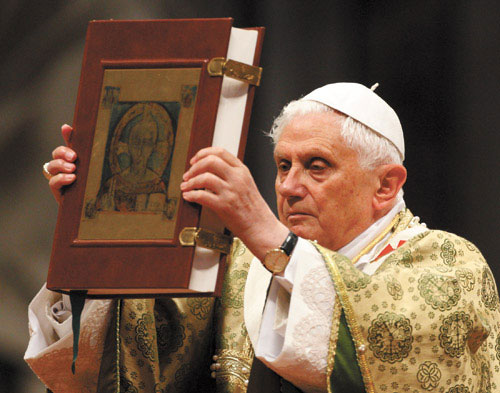
Just think how easily the meaning of our e-mails can be misinterpreted, sometimes causing great strife between people. Then take the Bible, which is infinitely longer, more complex, and written over a millennia ago in a world very different from our own, and we can begin to see why Jesus wouldn’t leave His teaching to just a book.
The Church looks to what it calls Sacred Tradition—which is rooted in things like Church Councils, Creeds, and the early Fathers of the Church—to safeguard our interpretation of God’s Word. All of the Catholic Church’s beliefs can be traced back to the earliest Christians.
Our Lord also chose the twelve apostles to go out and make disciples of all nations1 and promised them the assistance of the Holy Spirit.2 The apostles ordained bishops who have succeeded them down to this present day.3 The Catholic Church is a living voice that rings out for all to hear, proclaiming and interpreting God’s Word to every generation.4
1 -Â Mt. 28:20
2 -Â Jn. 14:26
3 -Â cf. Acts 14:23; 1 Tim. 3:1-8; 2 Tim. 1:6; 2:2; Tit. 1:5; Js. 5:14; 1 Pt. 5:1; Jd. 8ff
4 -Â cf. 1 Tim. 3:15; Mt. 16:18
Tags: bible, catholic apologetics, catholic church, Church, Faith Check, holy spirit
This entry was posted on Tuesday, October 15th, 2013 at 12:35 am
You can follow any responses to this entry through the RSS 2.0 feed.
Church Authority to Interpret the Bible
[powerpress]
Many say that the Bible alone is all we need to know God’s Truth. But just look at all of the questions that
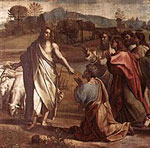 divide Christians today because of differing views over what the Bible teaches: Should infants be baptized?, can I lose my salvation?, or what about the many moral issues that we face?
divide Christians today because of differing views over what the Bible teaches: Should infants be baptized?, can I lose my salvation?, or what about the many moral issues that we face?
Our Lord said that a house divided cannot stand, and He never intended for His followers to interpret the Bible privately (2 Pet. 1:20). Jesus left us a visible Church whose leaders have authority to teach and govern God’s people.
In Matthew 18, Jesus said that insurmountable debates should be taken to the Church for resolution.1 For those that understand this and still refuse to listen to the Church, Jesus has a stern warning. Of course, to follow Jesus’ teaching on this necessarily requires a single Church that is organized and consistent.
For 2,000 years the Catholic Church has been fulfilling this role in order that the Body of Christ might experience the harmony of being truly unified in heart and mind. Small wonder St. Augustine said, “I would not believe in the Gospel myself if the authority of the Catholic Church did not influence me to do so.” 2
1 – Mt. 18:15-18
2 – Against the letter of Mani, 5,6, 397 A.D.
Tags: catholic apologetics, catholic church, Church, church authority, Faith Check, heart, Jesus
This entry was posted on Monday, September 9th, 2013 at 6:54 am
You can follow any responses to this entry through the RSS 2.0 feed.
Bruce and I had a conversation with Karl Schultz, editor of  “Christian Values and Virtues”  comprised of   Pope Paul VI’s 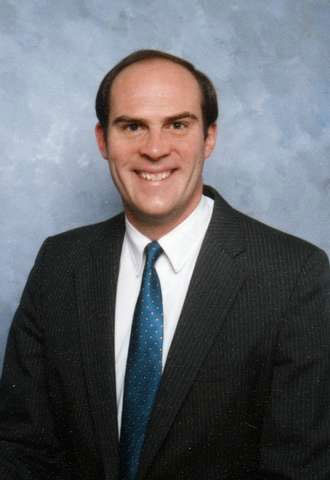 teachings on peace, hope, humility, faith, suffering, love, and joy as comprised through his public audiences and his writings. Karl also shares little known things about Pope Paul VI. This book is a must read for those interested in understanding the impact of Pope Paul VI’s papacy on the modern Catholic Church.
teachings on peace, hope, humility, faith, suffering, love, and joy as comprised through his public audiences and his writings. Karl also shares little known things about Pope Paul VI. This book is a must read for those interested in understanding the impact of Pope Paul VI’s papacy on the modern Catholic Church.
You can find the book here
Tags: catholic church, faith, joy, karl schultz, pope paul vi
This entry was posted on Tuesday, August 6th, 2013 at 9:53 am
You can follow any responses to this entry through the RSS 2.0 feed.
This is such an interesting conversation Bruce and I had with author John Salza! Â We discussed this time around, “The Biblical Basis for the Papacy”. Â Fascinating.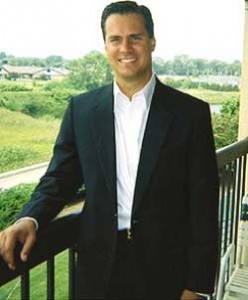
[powerpress]
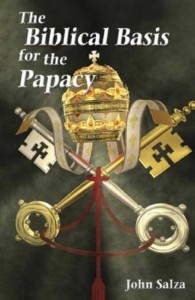 You can purchase the book here
You can purchase the book here
From the book description:
The Roman Catholic Papacy is the longest-living institution in the Western World – and at times one of the most controversial due to the basic doctrines of: Papal Authority, Papal Infallibility and Apostolic Succession. Drawing upon Old and New Testament Scripture, Tradition, and the words of the Early Church Fathers, author and noted Catholic apologist John Salza presents a comprehensive and compelling story of the office of the papacy from a biblical perspective. Arguments against the papacy are weighed and refuted in a charitable but convincing manner, making this a valuable resource for everyone intrigued or confused by the nearly 2,000 year old papal office – regardless of your faith background. Whether you are defending, questioning or exploring the Catholic Faith, this book provides the most concise and clear examination of the Catholic Church’s supreme teaching office as instituted by Christ, Our Lord and Savior.
Tags: catholic church, early church fathers, john salza, papacy
This entry was posted on Sunday, March 3rd, 2013 at 3:37 pm
You can follow any responses to this entry through the RSS 2.0 feed.
Thomas Craughwell in,  “Popes Who Resigned: Benedict Xvi and 13 Other Popes Who Retired (or Were Deposed)“, has once again proven why his writing is so fascinating and enjoyable. He never shys away from the uncomfortable fact. He presents the information with the peace and good humor which comes from the hindsight afforded by history and a knowledge of a God who eventually brings all things into in order despite his earthly children’s  best efforts to mess things up. We can learn much from a particular moment or action of human behavior in the curse of human history, and with Thomas Craughwell’s keen eye not much is missed. In this particular case, we can rest assured that the Barque of St. Peter sails the seas of human history helmed by the Holy Spirit more than by the hands of man, otherwise it would of crashed on the seashore of time long ago.
afforded by history and a knowledge of a God who eventually brings all things into in order despite his earthly children’s  best efforts to mess things up. We can learn much from a particular moment or action of human behavior in the curse of human history, and with Thomas Craughwell’s keen eye not much is missed. In this particular case, we can rest assured that the Barque of St. Peter sails the seas of human history helmed by the Holy Spirit more than by the hands of man, otherwise it would of crashed on the seashore of time long ago.
[powerpress]
The stories contained here are short and to the point, each representing a fascinating period in Church history. I appreciated his insights on the unique circumstances and personalities of Bl. John Paul Ii and Pope Benedict XVI, and why each chose the course they took in regards to their decisions to either remain or leave their role as Supreme Pontiff.
I am a big fan of Thomas Craughwell’s work…I wasn’t disappointed.
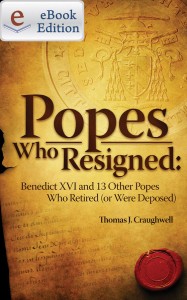 You can obtain the book here
You can obtain the book here
From the book description:
On February 11, 2013, Pope Benedict XVI shocked Catholics and the world by announcing that he would resign from the papacy. It was the first papal resignation in 600 years, and it has caused Catholics the world over to scramble for answers. Now, in Popes Who Resigned, Thomas J. Craughwell answers those burning questions, including:
– Why did Benedict XVI resign… and why didn’t John Paul II?
– What does the Catholic Church teach about papal resignation?
– Who were the other popes that resigned, and why?
– And much more.
In these tumultuous times, Craughwell points even now to the rock that is the Catholic Church, digging into Canon law and Church history for answers. Popes Who Resigned is a must read for Catholics and non-Catholics alike who are trying to make sense of Benedict XVI’s resignation and what it means for the papacy, the Church, and the world.
Tags: catholic church, Church, holy spirit, Thomas Craughwell
This entry was posted on Thursday, February 28th, 2013 at 11:55 am
You can follow any responses to this entry through the RSS 2.0 feed.
What a delight to talk with Tom Peterson!  With a joyful enthusiasm fueled by his rich prayer life, Tom has become a compelling leader in the New Evangelization, especially in the United 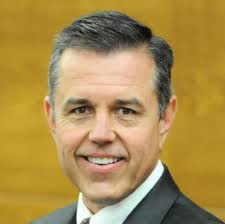 States.  With his book ,”Catholics Come Home: God’s Extraordinary Plan for Your Life” , he expands his list of significant contributions to that effort  which have encouraged countless souls to embrace the gift of the Catholic faith.  Not only does he share his own powerful witness, but he offers practical catechesis to foster on-going conversion in the heart of the seeking soul and encouragement to all to share the Good News.  Excellent!
States.  With his book ,”Catholics Come Home: God’s Extraordinary Plan for Your Life” , he expands his list of significant contributions to that effort  which have encouraged countless souls to embrace the gift of the Catholic faith.  Not only does he share his own powerful witness, but he offers practical catechesis to foster on-going conversion in the heart of the seeking soul and encouragement to all to share the Good News.  Excellent!
[powerpress]
You can find the book here
Also check out Tom’s work at virtuemedia.org and CatholicComeHome.org
“We are in the midst of a New Evangelization; and I believe this book is a signal moment in its success. It is also a sign that will lead many folks back home to the family of God, which is Catholic Church.â€
—Dr. Scott W. Hahn, author of The Lamb’s Supper and Signs of Life
Â
“Catholics Come Home is a powerful sacramental, a means of grace. It is a willing, waiting taxi to take us home, to our home away from Home, the Catholic Church, the Mystical Body of Christ.â€
—Dr. Peter Kreeft, author of Handbook of Christian Apologetics
Tags: catholic church, conversion, Good News, new evangelization, United States
This entry was posted on Monday, February 25th, 2013 at 10:06 am
You can follow any responses to this entry through the RSS 2.0 feed.
He just gets better and better.  Of course, I’m talking about Mike Aquilina and his joy and enthusiasm for the Catholic Church 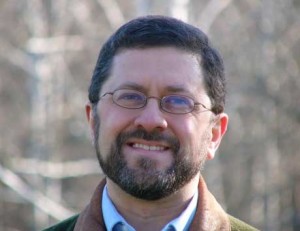 abounds in “Yours is the Church:  How Catholicism Shapes Our World“.  Mike is so good at getting to the nuggets contained in history and reminding us all of the significant contributions made by the Church which have changed our world for the better.  Whether it is the moral leadership it has offered which has been the rudder steadying our course, or the beauty of the arts which fashion it’s sails, the barque of the Church sails the seas of time on a course to the New Jerusalem.  Putting it all into a wonderful historic perspective, Mike Aquilina offers us a “must have” book that should be in every Catholic home and given to anyone joining this beautiful Church of ours.  Thanks Mike!
abounds in “Yours is the Church:  How Catholicism Shapes Our World“.  Mike is so good at getting to the nuggets contained in history and reminding us all of the significant contributions made by the Church which have changed our world for the better.  Whether it is the moral leadership it has offered which has been the rudder steadying our course, or the beauty of the arts which fashion it’s sails, the barque of the Church sails the seas of time on a course to the New Jerusalem.  Putting it all into a wonderful historic perspective, Mike Aquilina offers us a “must have” book that should be in every Catholic home and given to anyone joining this beautiful Church of ours.  Thanks Mike!
[powerpress]
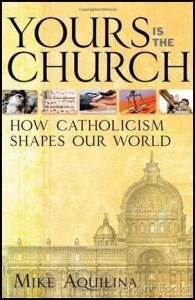 Your can find the book here
Your can find the book here
“Christianity has radically changed the world for the better.  In a book that’s both thoughtful and entertaining .  Mike Aquilina shows how the Gospel really has been the good news in the most practical ways possible.  Even the atheist ought  to thank…whoever he thanks….for the rise of Christianity.” — David Mills, executive editor of First Things
Tags: catholic church, Church, mike aquilina, New Jerusalem
This entry was posted on Monday, February 4th, 2013 at 1:22 pm
You can follow any responses to this entry through the RSS 2.0 feed.
“The Seven Big Myths About the Catholic Church: Distinguishing Fact from Fiction about Catholicism” Â by Dr. Christopher Kaczor is a 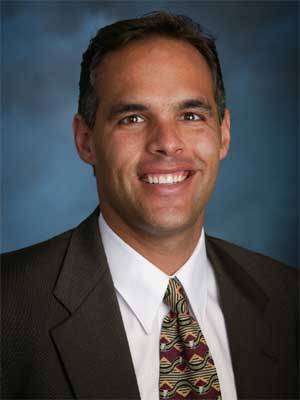 must have resource for Catholics!
must have resource for Catholics!
The misconceptions about our faith are so prevalent in today’s society that is almost guaranteed that you will encounter at least one of these myths in daily conversations with friends, co-workers, and sadly to say, family members.  To have the peace of mind, in order to answer the objection, is invaluable, especially when we are called to the New Evangelization.  But even more than that, Dr. Kaczor helps us to give a reason for our hope…the presence of Jesus Christ and His saving grace and mercy found in our Roman Catholic faith.
[powerpress]
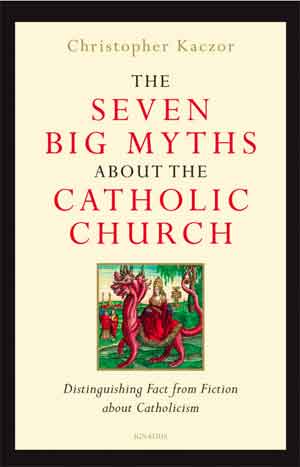 You can find the book here
You can find the book here
The Seven Myths:
The Church Opposes Science: The Myth of Catholic Irrationality
The Church Opposes Freedom and Happiness: The Myth of Catholic Indifference to Earthly Welfare
The Church Hates Women: The Myth of Catholic Misogyny
Indifferent to Love, the Church Banned Contraception: The Myth of Opposition between Love and Procreation
The Church Hates Gays: The Myth of Catholic “Homophobia”
The Church Opposes Same-Sex Marriage Because of Bigotry: The Myth That There Is No Rational Basis for Limiting Marriage to One Man and One Woman
Priestly Celibacy Caused the Crisis of Sexual Abuse of Minors: The Myth of Priestly Pedophilia
“All of this book is full of clarity and charity, but two chapters are masterpieces, each worth ten times the price of the whole book. The chapter on contraception is the most simple, commonsensical, winsome and persuasive I have ever seen. It could have been written only by a very good and wise husband and father. The chapter on same-sex marriage has the clearest and the completest logic I have ever read on the subject.” —Peter Kreeft, Boston College
Tags: catholic church, Catholic Irrationality The Church Opposes Freedom, Christopher Kaczor
This entry was posted on Monday, December 10th, 2012 at 7:22 am
You can follow any responses to this entry through the RSS 2.0 feed.
Episode 14- Regnum Novum: Bringing forth the New Evangelization through Catholic Social Teaching with Omar Gutierrez – Pope Pius XI and “QUADRAGESIMO ANNO” , Pope Pius XII and the Radio Addresses.
– Pope Pius XI and “QUADRAGESIMO ANNO” , Pope Pius XII and the Radio Addresses.
[powerpress]
We live at a very special time. The confluence of many things has brought forth the clear need to be able to articulate the Social Teaching of the Catholic Church in a way that is accessible and applicable. This is not to be an effort where high-minded theories are to be bandied about. Rather, this is a time of opportunity wherein we can apply the Social Doctrine to the concrete so as to bring about a New Kingdom, a Revolution. – Omar G.
Pope Pius XI (31 May 1857 – 10 February 1939), born Ambrogio Damiano Achille Ratti, was Pope from 6 February 1922, and sovereign of Vatican City from its creation as an independent state on 11 February 1929 until his death on 10 February 1939.  He issued numerous encyclicals including Quadragesimo Anno, highlighting capitalistic greed of international finance, and social justice issues, andQuas Primas, establishing the feast of Christ the King. He took as his papal motto, “Christ’s peace in Christ’s kingdom”.
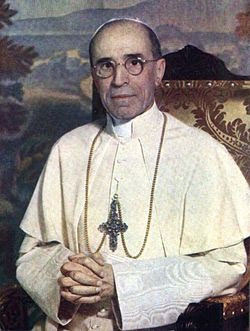 Venerable Pope Pius XII  born Eugenio Marìa Giuseppe Giovanni Pacelli (2 March 1876 – 9 October 1958), reigned as Pope, head of the Catholic Church and sovereign of Vatican City State, from 2 March 1939 until his death in 1958.
Venerable Pope Pius XII  born Eugenio Marìa Giuseppe Giovanni Pacelli (2 March 1876 – 9 October 1958), reigned as Pope, head of the Catholic Church and sovereign of Vatican City State, from 2 March 1939 until his death in 1958.
Also visit Omar’s “Discerning Hearts” page Catholic Social Teaching 101
Tags: catholic church, catholic social doctrine, catholic social teaching, papacy, Quadragesimo Anno, social doctrine
This entry was posted on Tuesday, July 31st, 2012 at 10:51 am
You can follow any responses to this entry through the RSS 2.0 feed.
USCCA11- Episode 11-Â The Four Marks of the Church
[powerpress]
Archbishop Lucas offers insights on the US Catholic Catechism for Adults Chapter 11:
“In the earliest professions of faith, the Catholic Church identified herself as “one, holy, catholic, and apostolic.”  We find these words in the Nicene Creed professed at Sunday Mass.  Traditionally, they refer to what are known as the four marks of the Church, traits that identify the Church before the world.”
The Most Reverend George J. Lucas leads the Archdiocese of Omaha.Â
For other episodes in the visit our Archbishop George Lucas page
This programs is based on:
More information can be found here.
We wish to thank the USCCB for the permissions granted for use of  relevant material used in this series.
Also we wish to thank Omar Gutierrez his vocal talents in this episode.
Tags: catholic, catholic church, catholic podcast, catholic prayer, cathollc spirituality, four marks of the church, George Lucas, The Four Marks of the Church, united states catechsim for adults
This entry was posted on Monday, May 14th, 2012 at 9:35 am
You can follow any responses to this entry through the RSS 2.0 feed.
The Teaching Authority of the Church
[powerpress]
Many scoff at the Church’s precepts and rules, and can’t fathom how our relationship with the Church could affect our relationship with Christ.
Let us remember that the high priests of Israel, due to their office, could inquire of the Lord.  And recall Caiaphas’ prophecy about Jesus’ 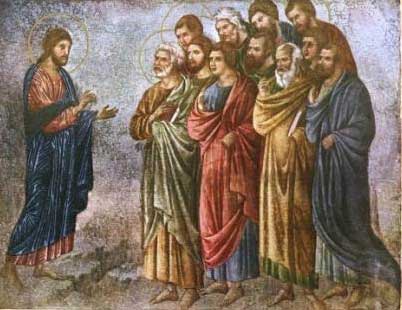 mission, which John 11 states was not said of his own accord, but in virtue of his being high priest that year.1
mission, which John 11 states was not said of his own accord, but in virtue of his being high priest that year.1
Our Lord upheld the legitimacy of the teaching office when He said in Matthew 23, “the scribes and the Pharisees sit on Moses’ seat, so practice and observe whatever they tell you,â€Â 2 though He quickly warned not to follow their bad example.
Jesus commissioned His apostles to be the leaders of His Church.  He told them, “As the Father sent me, so I send you,â€3 and “He who hears you hears me and he who rejects you rejects me.â€4
The popes and bishops of the Catholic Church succeed the apostles in their teaching office,5Â and it is they who, over the centuries, have passed on the Faith to us through creeds, Church councils, even Scripture itself.
We are called to accept the Church’s teachings with joy,6 knowing that the Church is a good mother who desires our eternal happiness—and, after all, who could reject his own mother?
1Â -Â Â Jn. 11:50
2Â -Â Â Mt. 23:2
3Â -Â Â Jn. 20:21
4Â -Â Â Lk. 10:16
5 -  See The Catechism of the Catholic Church 77, 861-2.
6 -  cf. Vatican II, Lumen Gentium 25
Tags: catholic, catholic church, catholic podcast, catholic prayer, cathollc spirituality, Church The Teaching Authority, teaching authority
This entry was posted on Wednesday, February 8th, 2012 at 7:41 am
You can follow any responses to this entry through the RSS 2.0 feed.
Organized Religion?
[powerpress]
It’s something we’ve all heard before: I believe in God, but not organized religion.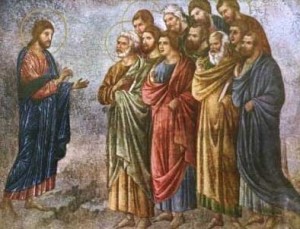
But as Catholics we believe that Jesus started a Church—yes an organized religion, if you will.
The Church is a gift to the world, which God has ordained as the vehicle in which we are sanctified and grow on the way to our heavenly destination.
Above all, the Catholic Church is a family. Man is not an island, as it was once famously said, and we need the community found in our brothers and sisters in the Faith.
A visible Church is necessary for the dispensing of the seven sacraments, which Jesus instituted for the forgiveness of sins and growth in grace.
And God has always desired that His people gather to give Him glory by corporate, liturgical worship and sacrifice, which is fulfilled in the New Covenant by the Holy Mass.
Yes, the organized institution of the Church has often had its share of scandals and sins. The human face of the Church can be messy and imperfect. But God does not desire for us to escape to a spiritual island or alternative religion, but to serve Him and His people in the Church He founded and has promised to be with until He returns in glory.
Tags: catholic, catholic church, catholic podcast, catholic prayer, cathollc spirituality, Organized Religion, religion, visible Church
This entry was posted on Wednesday, January 25th, 2012 at 7:56 am
You can follow any responses to this entry through the RSS 2.0 feed.

